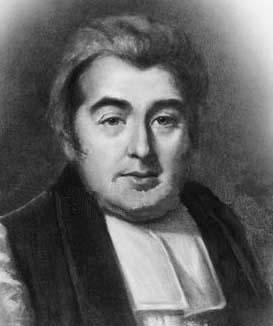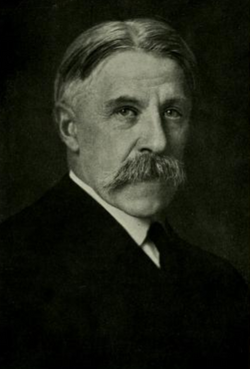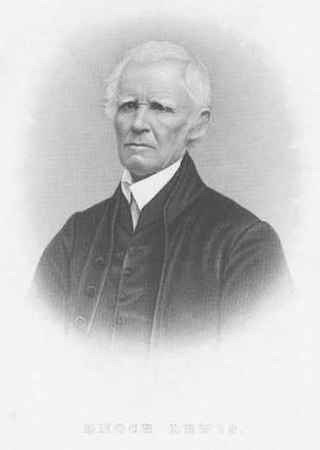
Haverford College is a private liberal arts college in Haverford, Pennsylvania. It was founded as a men's college in 1833 by members of the Religious Society of Friends (Quakers), began accepting non-Quakers in 1849, and became coeducational in 1980.

Johann Franz Encke was a German astronomer. Among his activities, he worked on the calculation of the periods of comets and asteroids, measured the distance from the Earth to the Sun, and made observations of the planet Saturn.

John Mortimer Brinkley was the first Royal Astronomer of Ireland and later Bishop of Cloyne. He was President of the Royal Irish Academy (1822–35), President of the Royal Astronomical Society (1831–33). He was awarded the Cunningham Medal in 1818, and the Copley Medal in 1824.

David Rittenhouse was an American astronomer, inventor, clockmaker, mathematician, surveyor, scientific instrument craftsman, and public official. Rittenhouse was a member of the American Philosophical Society and the first director of the United States Mint.

Joseph Hooton Taylor Jr. is an American astrophysicist and Nobel Prize laureate in Physics for his discovery with Russell Alan Hulse of a "new type of pulsar, a discovery that has opened up new possibilities for the study of gravitation."
Robert Woodhouse was a British mathematician and astronomer.

The Astronomical Society of the Pacific (ASP) is an American scientific and educational organization, founded in San Francisco on February 7, 1889. Its name derives from its origins on the Pacific Coast, but today it has members all over the country and the world. It has the legal status of a nonprofit organization.

The Association of Universities for Research in Astronomy (AURA) is a consortium of universities and other institutions that operates astronomical observatories and telescopes.

Robert Clarkson Clothier was the fourteenth President of Rutgers University serving from 1932 to 1951.

Ormond Stone, was an American astronomer, mathematician and educator. He was the director of Cincinnati Observatory and subsequently the first director of the McCormick Observatory at the University of Virginia, where he trained a significant number of scientists. He served as the editor of the Annals of Mathematics and towards the end of his life made donations which led to the founding of the Fairfax Public Library System.

William Paul Crillon Barton, was a medical botanist, physician, professor, naval surgeon, and botanical illustrator.
George W. Strawbridge Jr. is an American educator, historian, investor, sportsman and philanthropist.
Pliny Earle Chase was an American scientist, mathematician, and educator who contributed to the fields of astronomy, electromagnetism, and cryptography, among others.

George Aaron Barton was a Canadian author, Episcopal clergyman, and professor of Semitic languages and the history of religion.

The Haverford Fords compete at the NCAA Division III level in the Centennial Conference. The program has a modest history in collegiate athletics. Haverford boasts the only varsity cricket team in the United States. Its men's and women's track and field and cross country teams are perennial powerhouses in their division. The outdoor track and field team won the first 16 Centennial Conference championships, and men's cross country has won all but two Centennial Conference championships. The soccer team is among the nation's oldest, having won its first intercollegiate match in 1905 against Harvard College. The lacrosse team has placed well nationally in the NCAA championships, while Haverford's fencing team has competed since the early 1930s.

Francis Barton Gummere was a Professor of English, an influential scholar of folklore and ancient languages, and a student of Francis James Child.

Enoch Lewis was a mathematician. He early exhibited a talent for mathematics, at the age of fourteen was usher in a country school, and at fifteen became principal. In the autumn of 1792 he removed to Philadelphia, studied mathematics, teaching half of each day to earn his support, and in 1795 was engaged as a surveyor in laying out towns in western Pennsylvania under the direction of Andrew Ellicott.
Gummere is a surname. Notable people with the surname include:
Kimberly W. Benston is an American literary historian and academic administrator.














